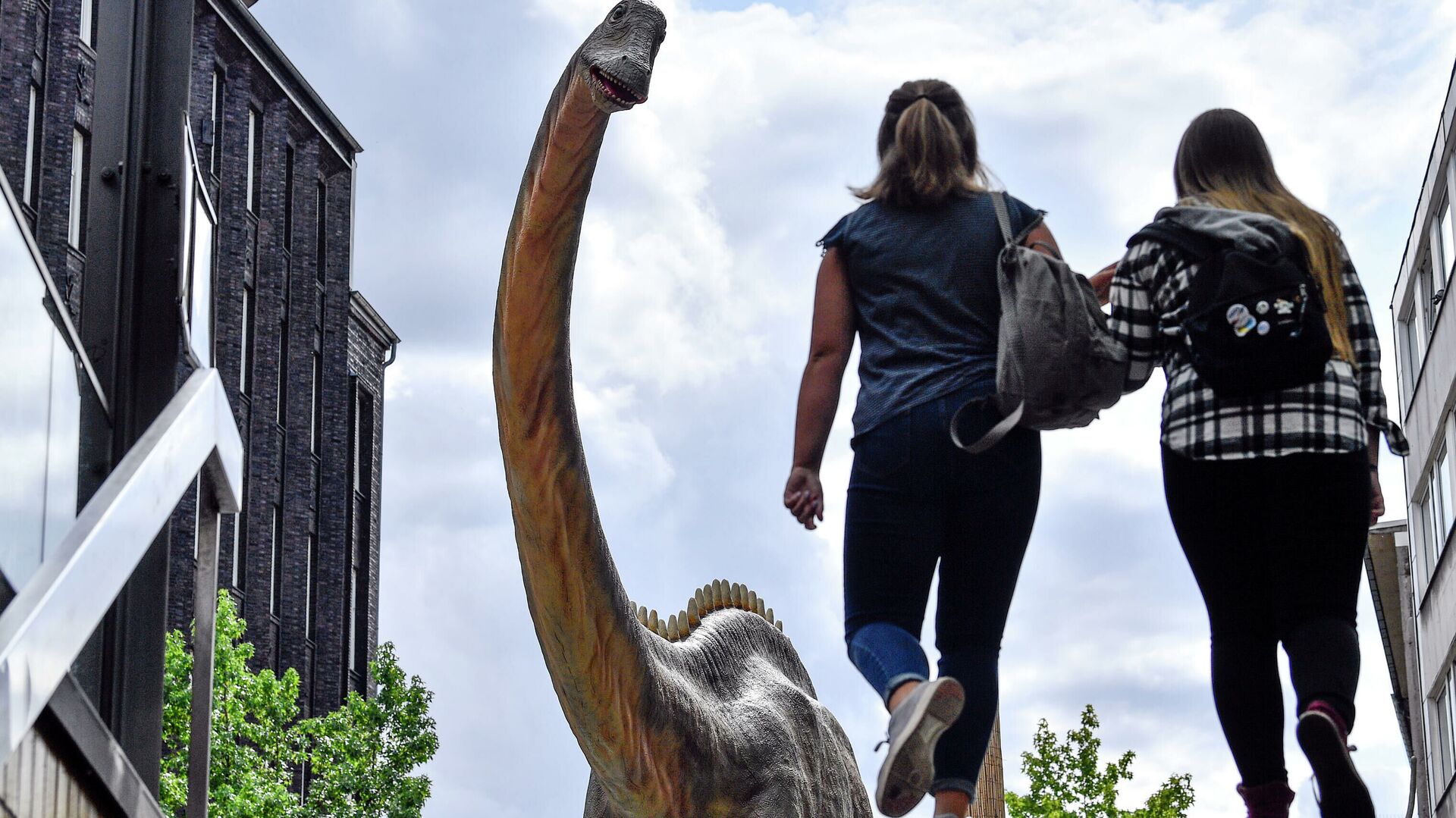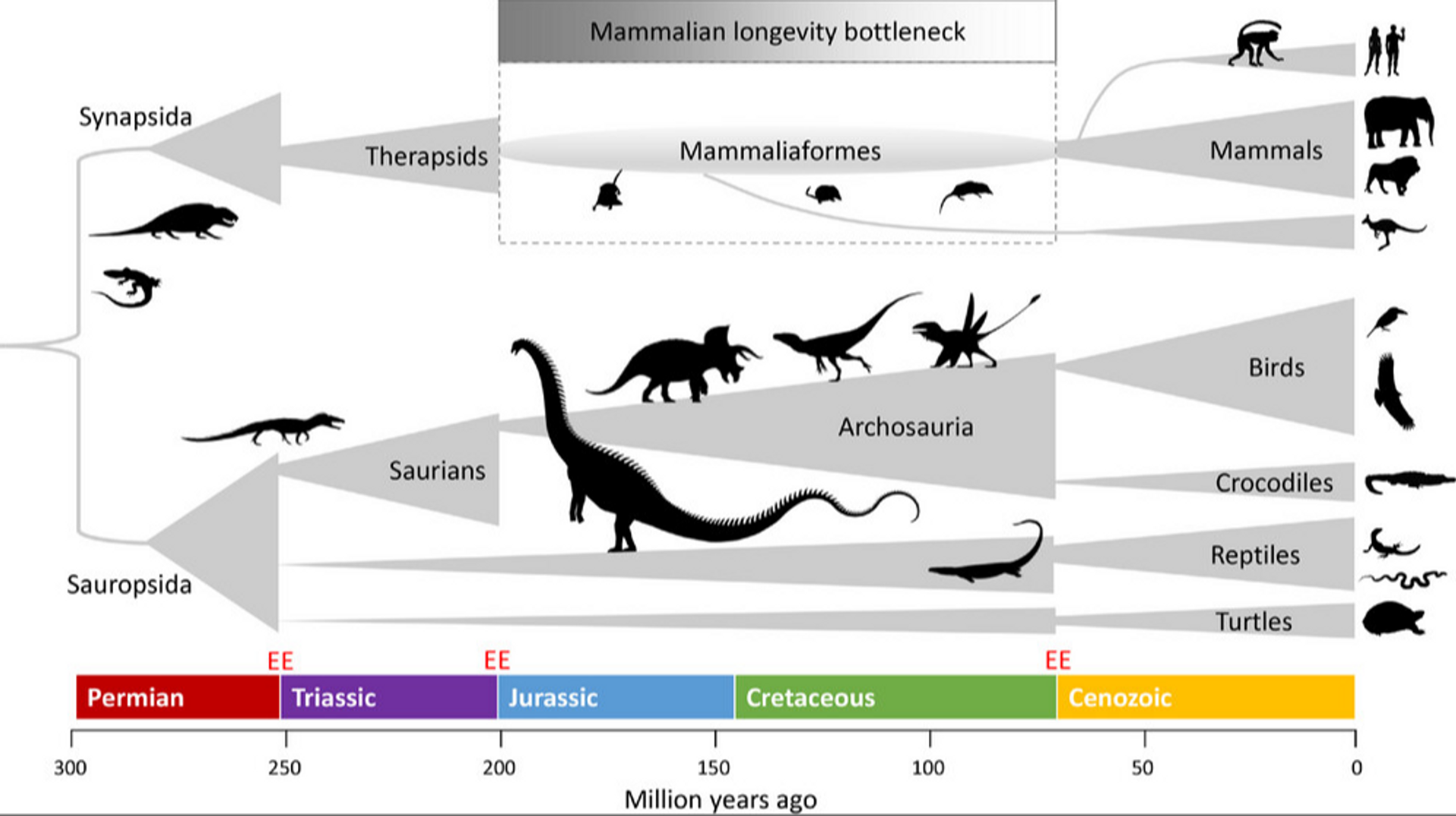https://sputnikglobe.com/20240108/are-dinosaurs-to-blame-for-humans-faster-aging-1116053339.html
Are Dinosaurs to Blame for Humans' Faster Aging?
Are Dinosaurs to Blame for Humans' Faster Aging?
Sputnik International
Despite their longevity, humans still have to deal with their bodies changing for the worse as they grow older. Many reptiles and other species experience a considerably slower aging process, showing few signs of deterioration through their lives. Why is this?
2024-01-08T14:37+0000
2024-01-08T14:37+0000
2024-01-08T15:45+0000
beyond politics
science & tech
society
newsfeed
pedro magalhaes
university of birmingham
https://cdn1.img.sputnikglobe.com/img/107662/21/1076622193_0:168:3044:1880_1920x0_80_0_0_c997f9e0c1a23de298a90f5ce07f59b4.jpg
A recent theory claims the 180-million-year age of the dinosaurs could have affected the human lifespan and aging process. While mammals, including humans, change in appearance as they age, many reptiles and amphibians age without noticeable effects until their deaths. A new theory, known as the 'longevity bottleneck hypothesis,' proposes that mammals faced strong selective pressure to evolve rapid reproduction when dinosaurs ruled the Earth.Over 100 million years, this pressure likely caused the loss of genes which promote longevity, especially those crucial for DNA repair and body tissue rejuvenation, according to an article in the journal BioEssays.“While humans are among the longest-living animals, there are many reptiles and other animals that have a much slower aging process and show minimal signs of senescence over their lives,” said study author Joao Pedro de Magalhaes, a biologist from the University of Birmingham.The hypothesis offers insights into the evolutionary factors affecting mammalian aging over millennia, he added.Certain creatures exhibit exceptional powers of cell repair and tissue regeneration, traits perhaps not vital for ancient mammals that managed to escape predators like Tyrannosaurus rex.Dr Magalhaes stressed that despite the large size and longevity of creatures like humans, elephants and whales, they still retain genetic imprints from the Mesozoic era. Interestingly, mammals, including humans, age faster than many reptilian species.While the conclusions remain in the realm of theory theory, further studies could provide insights into the higher rate of cancer in mammals compared to other species, the biologist said.
Sputnik International
feedback@sputniknews.com
+74956456601
MIA „Rossiya Segodnya“
2024
Chimauchem Nwosu
https://cdn1.img.sputnikglobe.com/img/07e7/09/01/1113046371_0:99:1536:1635_100x100_80_0_0_9c5c627283eca931c39fe4852bbb301c.jpg
Chimauchem Nwosu
https://cdn1.img.sputnikglobe.com/img/07e7/09/01/1113046371_0:99:1536:1635_100x100_80_0_0_9c5c627283eca931c39fe4852bbb301c.jpg
News
en_EN
Sputnik International
feedback@sputniknews.com
+74956456601
MIA „Rossiya Segodnya“
Sputnik International
feedback@sputniknews.com
+74956456601
MIA „Rossiya Segodnya“
Chimauchem Nwosu
https://cdn1.img.sputnikglobe.com/img/07e7/09/01/1113046371_0:99:1536:1635_100x100_80_0_0_9c5c627283eca931c39fe4852bbb301c.jpg
longevity bottleneck hypothesis, mammalian aging process, dna repair genes, dr. joao pedro de magalhaes, mesozoic era, t. rex, dinosaurs, cell repair abilities, tissue regeneration traits, mammalian cancer susceptibility.
longevity bottleneck hypothesis, mammalian aging process, dna repair genes, dr. joao pedro de magalhaes, mesozoic era, t. rex, dinosaurs, cell repair abilities, tissue regeneration traits, mammalian cancer susceptibility.
Are Dinosaurs to Blame for Humans' Faster Aging?
14:37 GMT 08.01.2024 (Updated: 15:45 GMT 08.01.2024) Despite their longevity, humans still have to deal with their bodies changing for the worse as they grow older. Many reptiles and other species experience a considerably slower aging process, showing few signs of deterioration through their lives. Why is this?
A recent theory claims the 180-million-year age of the dinosaurs could have affected the human lifespan and aging process.
While mammals, including humans, change in appearance as they age, many reptiles and amphibians age without noticeable effects until their deaths.
A new theory, known as the 'longevity bottleneck hypothesis,' proposes that mammals faced strong selective pressure to evolve rapid reproduction when dinosaurs ruled the Earth.
Over 100 million years, this pressure likely caused the loss of genes which promote longevity, especially those crucial for DNA repair and body tissue rejuvenation, according to an article in the
journal BioEssays.
“While humans are among the longest-living animals, there are many reptiles and other animals that have a much slower aging process and show minimal signs of senescence over their lives,” said study author Joao Pedro de Magalhaes, a biologist from the University of Birmingham.
The hypothesis offers insights into the evolutionary factors affecting mammalian aging over millennia, he added.
Certain creatures exhibit exceptional powers of cell repair and tissue regeneration, traits perhaps not vital for ancient mammals that managed to escape predators like Tyrannosaurus rex.
Dr Magalhaes stressed that despite the large size and longevity of creatures like humans, elephants and whales, they still retain genetic imprints from the Mesozoic era. Interestingly, mammals, including humans, age faster than many reptilian species.
While the conclusions remain in the realm of theory theory, further studies could provide insights into the higher rate of cancer in mammals compared to other species, the biologist said.




